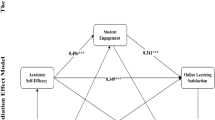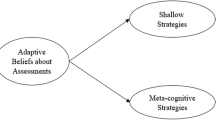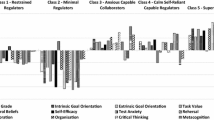Abstract
A conceptual framework for assessing student motivation and self-regulated learning in the college classroom is presented. The framework is based on a self-regulatory (SRL) perspective on student motivation and learning in contrast to a student approaches to learning (SAL) perspective. The differences between SRL and SAL approaches are discussed, as are the implications of the SRL conceptual framework for developing instruments to assess college student motivation and learning. The conceptual framework may be useful in guiding future research on college student motivation and learning.
Similar content being viewed by others
REFERENCES
Ajzen, I. (1988). Attitudes, Personality, and Behavior, Dorsey Press, Chicago.
Bandura, A. (1997). Self-Efficacy: The Exercise of Control, W.H. Freeman, New York.
Biggs, J. (1993). What do inventories of students' learning processes really measure? A theoretical review and clarification. Br. J. Educ. Psychol. 63: 3–19.
Biggs, J. (2001). Enhancing learning: A matter of style of approach? In Sternberg, R., and Zhang, L. (eds.), Perspectives on Thinking, Learning, and Cognitive Styles, Erlbaum, Mahwah, NJ, pp. 73–102.
Boekaerts, M. (1993). Being concerned with well-being and with learning. Educ. Psychol. 28: 148–167.
Boekaerts, M., and Niemivirta, M. (2000). Self-regulated learning: Finding a balance between learning goals and ego-protective goals. In Boekaerts, M., Pintrich, P.R., and Zeidner, M. (eds.), Handbook of Self-regulation: Theory, Research, and Applications, Academic Press, San Diego, CA, pp. 417–450.
Boekaerts, M., Pintrich, P.R., and Zeidner, M. (2000). Handbook of Self-Regulation, Academic Press, San Diego, CA.
Bransford, J., Brown, A., and Cocking, R. (1999). How People Learn: Brain, Mind, Experience, and School, National Academy Press, Washington, DC.
Corno, L. (1993). The best-laid plans: Modern conceptions of volition and educational research. Educ. Res. 22: 14–22.
Dyne, A., Taylor, P., and Boulton-Lewis, G. (1994). Information processing and the learning context: An analysis from recent perspectives in cognitive psychology. Br. J. Educ. Psychol. 64: 359–372.
Eccles, J.S., Wigfield, A., and Schiefele, U. (1998). Motivation to succeed. In Damon, W. (Series ed.) and N. Eisenberg (Vol. ed.), Handbook of Child Psychology: Vol. 3. Social, Emotional, and Personality Development, 5th edn., Wiley, New York, pp. 1017–1095.
Entwistle, N., and Waterston, S. (1988). Approaches to studying and levels of processing in university students. Br. J. Educ. Psychol. 58: 258–265.
Garcia, T., McCann, E., Turner, J., and Roska, L. (1998). Modeling the mediating role of volition in the learning process. Contemp. Educ. Psychol. 23: 392–418.
Garcia, T., and Pintrich, P.R. (1994). Regulating motivation and cognition in the classroom: The role of self-schemas and self-regulatory strategies. In Schunk, D.H., andZimmerman, B.J. (eds.), Self-Regulation of Learning and Performance: Issues and Educational Applications, Erlbaum, Hillsdale, NJ, pp. 127–153.
Gollwitzer, P. (1996). The volitional benefits of planning. In Gollwitzer, P., and Bargh, J. (eds.), The Psychology of Action: Linking Cognition and Motivation to Behavior, Guilford Press, New York, pp. 287–312.
Hofer, B., Yu, S., and Pintrich, P.R. (1998). Teaching college students to be self-regulated learners. In Schunk, D.H., and Zimmerman, B.J. (eds.), Self-Regulated Learning: From Teaching to Self-Reflective Practice, Guilford Press, New York, pp. 57–85.
Howard-Rose, D., and Winne, P. (1993). Measuring component and sets of cognitive processes in self-regulated learning. J. Educ. Psychol. 85(4): 591–604.
Karabenick, S., and Sharma, R. (1994). Seeking academic assistance as a strategic learning resource. In Pintrich, P.R., Brown, D.R., and Weinstein, C.E. (eds.), Student Motivation, Cognition, and Learning: Essays in Honor of Wilbert J. McKeachie, Erlbaum, Hillsdale, NJ, pp. 189–211.
Kuhl, J. (1984). Volitional aspects of achievement motivation and learned helplessness: Toward a comprehensive theory of action control. In Maher, B., and Maher, W. (eds.), Progress in Experimental Personality Research, Vol. 13, Academic Press, New York, pp. 99–171.
Lonka, K., and Lindblom-Ylanne, S. (1996). Epistemologies, conceptions of learning, and study practices in medicine and psychology. Higher Educ. 31: 5–24.
Marton, F., and Saljo, R. (1976). On qualitative differences in learning: I. Outcome and process. Br. J. Educ. Psychol. 46: 4–11.
McKeachie, W.J., Pintrich, P.R., and Lin, Y.G. (1985). Teaching learning strategies. Educ. Psychol. 20: 153–160.
Messick, S. (1989). Validity. In Linn, R.L. (ed.), Educational Measurement, 3rd edn., Macmillan, New York, pp. 13–104.
Midgley, C., Arunkumar, R., and Urdan, T. (1996). “If I don't do well tomorrow, there's a reason”: Predictors of adolescents' use of academic self-handicapping strategies. J. Educ. Psychol. 88: 423–434.
Newman, R. (1998). Adaptive help seeking: A role of social interaction in self-regulated learning. In Karabenick, S. (ed.), Strategic Help-Seeking: Implications for Learning and Teaching, Erlbaum, Hillsdale, NJ, pp. 13–37.
Norem, J.K., and Cantor, N. (1986). Defensive pessimism: Harnessing anxiety as motivation. J. Pers. Soc. Psychol. 51: 1208–1217.
Pintrich, P.R. (1999a). Taking control of research on volitional control: Challenges for future theory and research. Learn. Individ. Differ. 11: 335–354.
Pintrich, P.R. (1999b). The role of motivation in promoting and sustaining self-regulated learning. Int. J. Educ. Res. 31: 459–470.
Pintrich, P.R. (2000a). Educational psychology at the millennium: A look back and a look forward. Educ. Psychol. 35: 221–226.
Pintrich, P.R. (2000b). The role of goal orientation in self-regulated learning. In Boekaerts, M., Pintrich, P.R., and Zeidner, M. (eds.), Handbook of Self-Regulation, Academic Press, San Diego, CA, pp. 451–502.
Pintrich, P.R., and De Groot, E.V. (1990). Motivational and self-regulated learning components of classroom academic performance. J. Educ. Psychol. 82: 33–40.
Pintrich, P.R., McKeachie, W., and Lin, Y.-G. (1987). Teaching a course in learning to learn. Teach. Psychol. 14: 81–86.
Pintrich, P.R., and Schunk, D.H. (2002). Motivation in Education: Theory, Research and Applications, Prentice Hall Merrill, Upper Saddle River, NJ.
Pintrich, P.R., Smith, D., Garcia, T., and McKeachie, W. (1991). A Manual for the Use of the Motivated Strategies for Learning Questionnaire (MSLQ), The University of Michigan, Ann Arbor, MI.
Pintrich, P.R., Smith, D., Garcia, T., and McKeachie, W. (1993). Predictive validity and reliability of the Motivated Strategies for Learning Questionnaire (MSLQ). Educ. Psychol. Meas. 53: 801–813.
Pintrich, P.R., Wolters, C., and Baxter, G. (2000). Assessing metacognition and self-regulated learning. In Schraw, G., and Impara, J. (eds.), Issues in the Measurement of Metacognition, Buros Institute of Mental Measurements, Lincoln, NE.
Pressley, M., and Afflerbach, P. (1995). Verbal Protocols of Reading: The Nature of Constructively Responsive Reading, Erlbaum, Hillsdale, NJ.
Ryan, A., and Pintrich, P.R. (1997). “Should I ask for help?” The role of motivation and attitudes in adolescents' help seeking in math class. J. Educ. Psychol. 89: 329–341.
Sansone, C., Weir, C., Harpster, L., and Morgan, C. (1992). Once a boring task, always a boring task? The role of interest as a self-regulatory mechanism. J. Pers. Soc. Psychol. 63: 379–390.
Schneider, W., and Pressley, M. (1997). Memory Development Between 2 and 20, Erlbaum, Mahwah, NJ.
Schunk, D.H., and Ertmer, P. (2000). Self-regulation and academic learning: Self-efficacy enhancing interventions. In Boekaerts, M., Pintrich, P.R., and Zeidner, M. (eds.), Handbook of Self-Regulation, Academic Press, San Diego, CA, pp. 631–649.
Simpson, M., Hynd, C., Nist, S., and Burrell, K. (1997). College academic assistance programs and practices. Educ. Psychol. Rev. 9: 39–87.
Snow, R., Corno, L., and Jackson, D. (1996). Individual differences in affective and conative functions. In Berliner, D., and Calfee, R. (eds.), Handbook of Educational Psychology, Macmillan, New York, pp. 243–310.
Stokes, D. (1997). Pasteur's Quadrant: Basic Science and Technological Innovation, Brookings Institute, Washington, DC.
Trigwell, K., Prosser, M., and Waterhouse, F. (1999). Relations between teachers' approaches to teaching and student approaches to learning. Higher Educ. 37: 57–70.
VanderStoep, S., Pintrich, P.R., and Fagerlin, A. (1996). Disciplinary differences in self-regulated learning in college students. Contemp. Educ. Psychol. 21: 345–362.
Vermetten, Y., Lodewijks, H., and Vermunt, J. (1999). Consistency and variability of learning strategies in different university courses. Higher Educ. 37: 1–21.
Vermunt, J. (1996). Metacognitive, cognitive, and affective aspects of learning styles and strategies: A phenomenographic analysis. Higher Educ. 31: 25–50.
Weiner, B. (1986). An Attributional Theory of Motivation and Emotion, Springer-Verlag, New York.
Weinstein, C., and Mayer, R. (1986). The teaching of learning strategies. In Wittrock, M. (ed.), Handbook of Research on Teaching and Learning, Macmillan, New York, pp. 315–327.
Weinstein, C., Zimmermann, S., and Palmer, D. (1988). Assessing learning strategies: The design and development of the LASSI. In Weinstein, C., Goetz, E., and Alexander, P. (eds.), Learning and Study Strategies: Issues in Assessment, Instruction, and Evaluation, Academic Press, San Diego, CA, pp. 25–40.
Winne, P., and Hadwin, A. (1998). Studying as self-regulated learning. In Hacker, D., Dunlosky, J., and Graesser, A. (eds.), Metacognition in Educational Theory and Practice, Erlbaum, Hillsdale, NJ, pp. 279–306.
Winne, P., Jamieson-Noel, D., and Muis, K. (2001). Methodological issues and advances in researching tactics, strategies, and self-regulated learning. In Pintrich, P.R., and Maehr, M.L. (eds.), Advances in Motivation and Achievement: Vol. 12. New Directions in Measures and Methods, JAI Press Elsevier Science, Amsterdam, pp. 121–155.
Winne, P., and Perry, N. (2000). Measuring self-regulated learning. In Boekaerts, M., Pintrich, P.R., and Zeidner, M. (eds.), Handbook of Self-Regulation, Academic Press, San Diego, CA, pp. 531–566.
Wolters, C. (1998). Self-regulated learning and college students' regulation of motivation. J. Educ. Psychol. 90: 224–235.
Wolters, C., and Pintrich, P.R. (1998). Contextual differences in student motivation and self-regulated learning in mathematics, English, and social studies classrooms. Instr. Sci. 26: 27–47.
Zeidner, M. (1998). Test Anxiety: The State of the Art, Plenum, NewYork.
Zimmerman, B.J. (1998). Academic studying and the development of personal skill: A self-regulatory perspective. Educ. Psychol. 33: 73–86.
Zimmerman, B.J. (2000). Attaining self-regulation: A social cognitive perspective. In Boekaerts, M., Pintrich, P.R., and Zeidner, M. (eds.), Handbook of Self-Regulation: Theory, Research, and Applications, Academic Press, San Diego, CA, pp. 13–39.
Zimmerman, B.J., and Martinez-Pons, M. (1986). Development of a structured interview for assessing student use of self-regulated learning strategies. Am. Educ. Res. J. 23: 614–628.
Author information
Authors and Affiliations
Corresponding author
Rights and permissions
About this article
Cite this article
Pintrich, P.R. A Conceptual Framework for Assessing Motivation and Self-Regulated Learning in College Students. Educational Psychology Review 16, 385–407 (2004). https://doi.org/10.1007/s10648-004-0006-x
Issue Date:
DOI: https://doi.org/10.1007/s10648-004-0006-x




